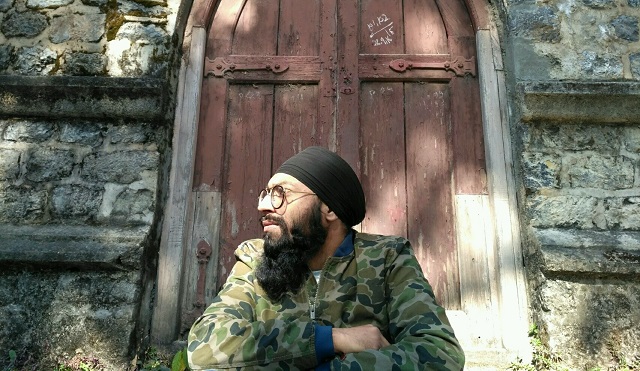Desi hip-hop may just have found its newest game-changer

Prabh Deep is on the rise to take over the Indian hip-hop scene. Photo: Courtesy of the artist
When New Delhi rapper Prabh Deep, born Prabhdeep Sagar Singh, began to lose faith in breakdancing, his primary hobby and occasional source of income, he started working at a call center. “I thought, ”˜I think call centers are the best for me, because I’m school dropped-out, I have no degree,’” recalls Singh. It wasn’t just the lack of education requirements and the promise of a stable income that drew him to the profession, however. “I really wanted to learn a few things, because call centers was always interesting to me,” he says.
You would be forgiven if you should find yourself confused as to how an exuberant 23-year-old like Singh would find the idea of a call center “interesting”””images of labyrinthine grey cubicles and sleep deprived employees glued to their headsets don’t exactly roil the blood. Perhaps Singh is aware of this paradox, because it’s with a wry smile that he continues, “I really wanted to judge people over the call, how they say things, you know.” He grins. “I did that for four years. Now I can guess, by hi and hellos, what the mood is [on the other] side.”
Such sensitivity to the relationship between voice and emotion should be unsurprising coming from any rapper, whose chief art is to intuit and deliver both. But Singh displays a particular fascination for it, as well as for learning in general, and for finding connections between things””proclivities that make themselves evident in both his music and his conversation.
Over the last couple of years, Singh has released pithy, beat-driven singles like “Kal,” “G Maane” and “Suno,” which have lead to various lenses through which the public has attempted to classify him. He is the outspoken “underground” rapper poised to take over the burgeoning Indian hip-hop scene; he is the classically humble artist with no airs, no attitude (unlike those other rappers who don’t downplay their successes enough to be unthreatening to the masses); he is the good Sikh boy spinning rap flows out of traditional Punjabi folk rhythms.
It is these very classifications that Singh hopes to dismantle with his long anticipated debut album, Class-Sikh. Aside from the obvious play on words, the word “class” in the album’s title is just as much an indication of Singh’s incisive critique on India’s education system as it is his observations of life on the low-income streets around him. Though the album is bursting with occasionally cheesy aphorisms about meaningful rap, Singh’s choice of subject matter never feels contrived.
“I don’t force myself to write about particular issues,” says Singh. “Those social issues are issues which I’ve experienced myself.” Singh’s observations of life in and around Tilak Nagar are what entirely inform his lyrics, but he sees no reason to continue rapping about that neighborhood’s issues should he gain the resources to move to a higher income area. “Right now, I’m in this lower middle-class society,” Singh explains. “If I blow up this time and I buy a house in a different locality, then I’ll be surrounded by different social issues.”
Singh’s strength as a rapper lies in his refusal to conform to the molds that people have ascribed to his “gully rap” peers. He doesn’t rap about drugs to project some street-hardened ideal. He raps about drugs because that’s what he can see in front of him. “I’m surrounded by it,” he says, wearily. “It’s medium of celebrating anything in my streets. If people want to celebrate, they want to celebrate with drugs.”
If it seems as though Singh is a cynic, jaded after just a few years on the scene, look more carefully. There is joy to be found here, even on Class-Sikh’s darkest moments. On “Suno,” a song prefaced by a story about a young schoolboy’s suicide, Singh’s artfully languid flow, contrasted with his sharp, punchy delivery, exposes his true love of the art form. Even when shit gets real, he’s still clearly having fun.
“I used to take stress of every little thing. Hip-hop helped me release that stress in my life, because I grew up in a different kind of surrounding,” says Singh. “I got bullied so much, I had no money, we were poor. My whole childhood was like, empty pockets and everything. When hip-hop came into my life, I was really, really happy. I’m really enjoying this stuff.”
Stream ‘Class-Sikh’ below:
The annual blues festival in Mumbai takes place on Feb. 14 and 15, 2026, bringing…
By mixing self-love anthems with cool Korean traditions and fan-run events, K-pop has turned February…
From light-based holograms that hover like mystical creatures to immersive sets inside a 360-degree dome…
From mindful intimacy workshops to run club shenanigans, these are the coolest events to bookmark…
BTS World Tour ‘Arirang’ Live Viewing will feature the band’s shows in Goyang, South Korea,…
Attempts to reach a deal between the co-stars were unsuccessful. A trial has been set…